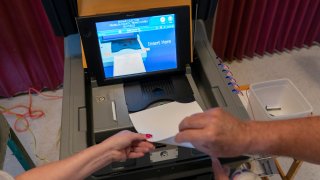
Elections officials across Pennsylvania have begun assessing their voting machines using a procedure known as logic and accuracy testing, which helps confirm their equipment is working properly ahead of Election Day.
All election equipment used by Pennsylvania counties — ranging from ballot-marking devices used for some in-person voting to machines that tabulate mail and absentee ballots — is put through this pre-election stress test.
Counties in the commonwealth are required by law to conduct logic and accuracy testing before any election, according to the Pennsylvania Department of State. All states do similar testing.
“Really, we are testing the voting system end to end,” said Forrest Lehman, director of elections and registration in Lycoming County. “It’s almost like we’re running a small-scale election.”
Get top local stories in Philly delivered to you every morning. Sign up for NBC Philadelphia's News Headlines newsletter.
___
How it works
During logic and accuracy testing, election officials create sample ballots with various configurations of layouts and votes, which is known as a “test deck.”
Local
Breaking news and the stories that matter to your neighborhood.
The test deck includes ballots that are designed to trigger warnings or fail, such as ballots with no votes at all or too many votes in a contest. The test deck is run through the machines to ensure they are counting votes accurately and flagging errors.
This process helps officials confirm not only that the machines are working properly but that ballots are laid out properly and don't have any proofing errors, such as missing candidates.
“Logic and accuracy testing, combined with post-election audits of the voted ballots, consistently provide evidence that voting machines are doing what they’re supposed to do,” said Mark Lindeman, director of policy and strategy at Verified Voting, a group that tracks voting technology in the U.S. "The systems and processes are good, and they’re getting better.”
___
What's happening here
Pennsylvania counties have until 15 days before the election to certify that they have completed the logic and accuracy test. How long it takes them varies.
Philadelphia finished its testing on central tabulation scanners for mail ballots and ballot marking devices used for in-person voting on Friday, Nick Custodio, deputy to Philadelphia City Commission Vice Chair Lisa Deeley, wrote in an email. Local officials will continue to conduct a “functional test” on all ballot marking devices, a process that will take at least another week.
Snyder County Director of Elections Devin Rhoads anticipates his county's testing will begin in October and be “wrapped up in three days.”
Pennsylvania counties also are required to notify the chairs of local political parties when and where they will conduct logic and accuracy testing. Counties should also notify the public, according to the Pennsylvania Department of State. Rhoads said anybody who wishes to observe Snyder County's testing is welcome.
“We’re open and transparent,” Rhoads said. “If I have a person who is questioning or doesn’t believe in the system or is worried about conspiracy theories and they want me to hold their hand and show them and everything, what’s going on, I will do that.”
Lycoming County will likely do its logic and accuracy test in mid-October, Lehman said. The most common issue he encounters during testing is precinct scanners — machines that scan ballots cast in person at the polls — not turning on. They have spare scanners to swap in if that happens.
Other county election officials say they will run their tests over the coming weeks.
After the testing, officials reset the machines and secure them in locked facilities until distribution for Election Day.
___
This story is part of an explanatory series focused on Pennsylvania elections produced collaboratively by WITF in Harrisburg and The Associated Press.
___
The AP receives support from several private foundations to enhance its explanatory coverage of elections and democracy. See more about AP’s democracy initiative here.
Sign up for our Breaking newsletter to get the most urgent news stories in your inbox.



